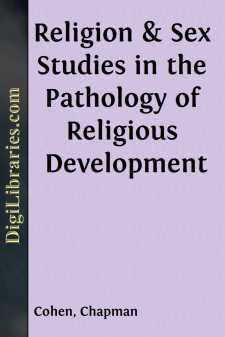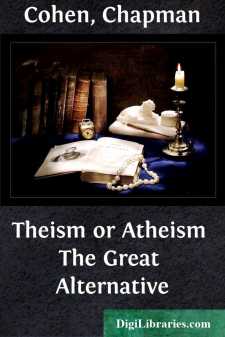Categories
- Antiques & Collectibles 13
- Architecture 36
- Art 48
- Bibles 22
- Biography & Autobiography 813
- Body, Mind & Spirit 142
- Business & Economics 28
- Children's Books 15
- Children's Fiction 12
- Computers 4
- Cooking 94
- Crafts & Hobbies 4
- Drama 346
- Education 46
- Family & Relationships 57
- Fiction 11828
- Games 19
- Gardening 17
- Health & Fitness 34
- History 1377
- House & Home 1
- Humor 147
- Juvenile Fiction 1873
- Juvenile Nonfiction 202
- Language Arts & Disciplines 88
- Law 16
- Literary Collections 686
- Literary Criticism 179
- Mathematics 13
- Medical 41
- Music 40
- Nature 179
- Non-Classifiable 1768
- Performing Arts 7
- Periodicals 1453
- Philosophy 64
- Photography 2
- Poetry 896
- Political Science 203
- Psychology 42
- Reference 154
- Religion 513
- Science 126
- Self-Help 84
- Social Science 81
- Sports & Recreation 34
- Study Aids 3
- Technology & Engineering 59
- Transportation 23
- Travel 463
- True Crime 29
Chapman Cohen
Chapman Cohen (1868–1954) was a prominent British atheist, secularist, and writer known for his work in promoting rationalism and free thought. He served as the president of the National Secular Society and was a key figure in advocating for humanism and atheism in the early 20th century. Cohen authored several influential books, including "Religion and Science" and "Theism or Atheism: The Great Alternative," which challenged religious doctrines and promoted secular philosophy. His writings contributed significantly to the intellectual debate on religion and science in his time.
Author's Books:
Sort by:
by:
Chapman Cohen
PREFACE In spite of all that has been done in the way of applying scientific principles to religious ideas, there is much that yet remains to be accomplished. Generally speaking science has only dealt with the subject of religion in its more normal and more regularised forms. The last half-century has produced many elaborate and fruitful studies of the origin of religious ideas, while comparative...
more...
by:
Chapman Cohen
Preface. Shrouded in the cloak of philosophy, the question of the existence of God continues to attract attention, and, I may add, to command more respect than it deserves. For it is only by a subterfuge that it assumes the rank of philosophy. "God" enters into philosophy only when it is beginning to lose caste in its proper home, and then in its new environment it undergoes such a...
more...



